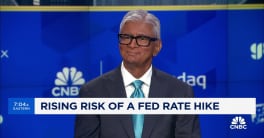After a couple of weeks of slight declines, the message on the rates front was mixed for the week ended November 30 according to Freddie Mac's Weekly Primary Mortgage Market Survey and December 2 for the Mortgage Bankers Association's Weekly Application's Survey. The changes, however, appeared to signal that rates were on the upswing once again.
Freddie Mac reported a small decrease in the 30-year fixed rate mortgage
rate to 6.26 percent from 6.26 percent the previous week. Fees and
points also eased off slightly to 0.5 from 0.6. The 15-year fixed rate was unchanged
at 5.81 percent although fees and points dropped from 0.6 to 0.5.
Both adjustable rate mortgages tracked by Freddie Mac were up for the week. The
5/1 ARM edged up one basis point to 5.75 percent and the 1-year ARM increased
two basis points to 5.16 percent. Fees for the 5/1 dropped from 0.8 to 0.6 while
fees on the 1-year were up from 0.7 to 0.8, the highest for that product since
the end of March.
The MBA survey was more decisive. It reported increases, all in double digits, across the board. Its survey stated that the average contract interest rate for 30-year fixed-rate mortgages increased to 6.32 percent from 6.20 percent, with points increasing to 1.30 from 1.17 (including the origination fee) for 80 percent loan-to-value loans.
15-year fixed-rate mortgages were also up 12 basis points to 5.84 percent with points increasing to 1.37 from 1.26.
One-year ARMs increased to 5.49 percent from 5.39 percent one week earlier, but points decreased to 0.91 from 0.96.
MBA's Market Composite Index - a measure of mortgage loan applications increased 5.2 percent on a seasonally adjusted basis from one week earlier. On an unadjusted basis, the Index increased 46.8 percent compared with the previous week which was shortened by the Thanksgiving holiday, but was down 6.1 percent compared with the same week one year earlier.
Refinancing as a percent of total mortgage applications bounced back to 41 percent from 39.1 the previous week and adjustable rate mortgages continued to hold on to their near 1/3 market share, up a scant 0.1 percent to 33.1 percent from the previous week.







